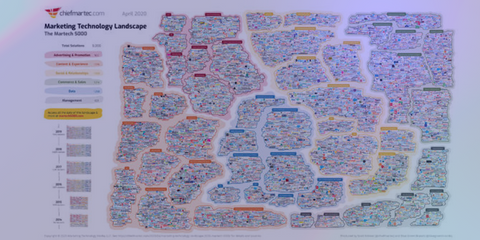SaaS Advisor provides a summarized analysis of the Discover Martech event and the new Marketing Technology Landscape for 2020. For a comprehensive overview of Martech, please refer to our detailed article.
The Discover Martech event, a major fixture in the Marketing Technology world, took place last week from April 21 to April 23. Due to COVID-19, this year's event was fully digitalized and is available for replay via this link.
The event featured around forty sessions led by various vendors, including the highly anticipated keynote by Scott Brinker, who traditionally unveils the Marketing Technology Landscape. Since 2011, this landscape has cataloged all existing tools in the market by category and subcategory.
The 2020 Martech edition features a new design for the occasion:

The 5 key Highlights of Martech 2020:
1. Exponential Growth
MarTech has experienced a staggering 5,233% growth since 2011, with the market now 50 times its original size.

2. Consolidation Trends
While consolidation within the market is a recurring theme, the landscape reveals that the market continues to expand significantly. This year, one in five solutions was not present in last year’s landscape.

3. Rapid Expansion
The MarTech sector continues to grow rapidly, with many new solutions emerging annually.

4. Data Tools Surge
Data tools have shown the most significant increase, with a growth rate of +25%.

5. Emergence of Platform Ecosystems
We may be approaching a new golden age characterized by “platform ecosystems.” Brands might need to invest in primary solutions for specific needs (such as CRM) and build a connected ecosystem of tools around them. The role of Business Intelligence solutions in consolidating and strategizing these data becomes increasingly relevant.

Platform Ecosystems Model
Traditionally, "Best of Breed" versus "Suite Solutions" have been the dominant models. Scott Brinker suggests that a third approach, "platform ecosystems," is gaining traction. Brands should invest in key solutions for specific needs and create an ecosystem of interconnected tools. The value of Business Intelligence tools for data consolidation and strategic use is becoming evident.
Several stack examples were presented during the keynote:


Roles of Marketing Technologists
Beyond the landscape, Brinker’s keynote addressed the role of Marketing Technologists. This emerging role, whether integrated within digital marketing departments or operating externally, involves understanding business needs and technologies—what they can and cannot do—and ensuring these technologies work together seamlessly.
Responsibilities for Marketing Technologists are expanding, as illustrated by the latest joint study from Chiefmartec.com and Martech Today:

Their role is becoming increasingly central within organizations:

Do you have thoughts on these tools? Want to learn more?
For more insights on this topic, check out our dedicated article on the Marketing Technologist.





